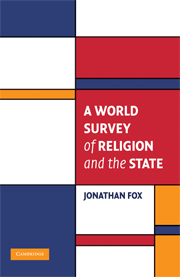Book contents
- Frontmatter
- Contents
- Acknowledgments
- 1 Introduction
- 2 The Question of Religion's Role in Politics and Society Modernization, Secularization, and Beyond?
- 3 Quantifying Religion
- 4 Global GIR from 1990 to 2002
- 5 Western Democracies
- 6 The Former Soviet Bloc
- 7 Asia
- 8 The Middle East and North Africa
- 9 Sub-Saharan Africa
- 10 Latin America
- 11 Patterns and Trends
- 12 Conclusions
- Appendix: Data Collection and Reliability
- Bibliography
- Index
2 - The Question of Religion's Role in Politics and Society Modernization, Secularization, and Beyond?
Published online by Cambridge University Press: 05 June 2012
- Frontmatter
- Contents
- Acknowledgments
- 1 Introduction
- 2 The Question of Religion's Role in Politics and Society Modernization, Secularization, and Beyond?
- 3 Quantifying Religion
- 4 Global GIR from 1990 to 2002
- 5 Western Democracies
- 6 The Former Soviet Bloc
- 7 Asia
- 8 The Middle East and North Africa
- 9 Sub-Saharan Africa
- 10 Latin America
- 11 Patterns and Trends
- 12 Conclusions
- Appendix: Data Collection and Reliability
- Bibliography
- Index
Summary
Modernization and secularization theory – the argument that religion is becoming less important as a political and social factor in modern times – have had a far-reaching influence on the study of religion in the social sciences. Exactly how far-reaching this influence has been is a topic of debate that is beyond the scope of this study. It is sufficient to say that a large plurality of the scholars familiar with the topic would likely agree with the following. First, this body of theory, at the very least, was among the most prominent theories on the role of religion in politics and society for much of the twentieth century. Second, some have claimed that it reached the point of a paradigm that was nearly unquestioned in some circles. By this I mean that it is a fact that some have made this claim, not that all would agree with it. Third, by the late twentieth century, among social scientists, the level of acceptance of this body of theory has decreased and the study of religion has increased. While modernization theory and secularization theory are two distinct, but related, bodies of theory, when discussing them as a whole I refer to them as modernization-secularization theory.
Among those who support or describe this body of theory there is little agreement on secularization's definition, including how much of a decline in religion constitutes secularization.
- Type
- Chapter
- Information
- A World Survey of Religion and the State , pp. 12 - 31Publisher: Cambridge University PressPrint publication year: 2008

